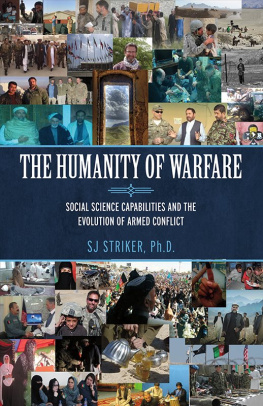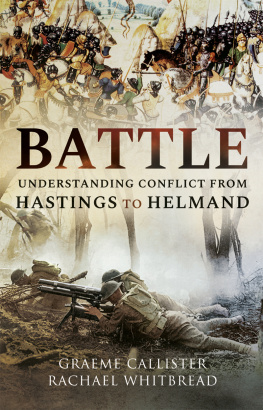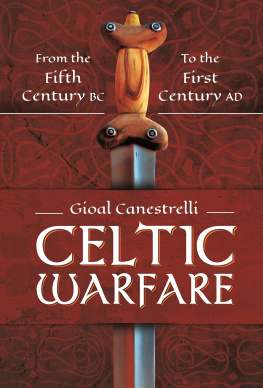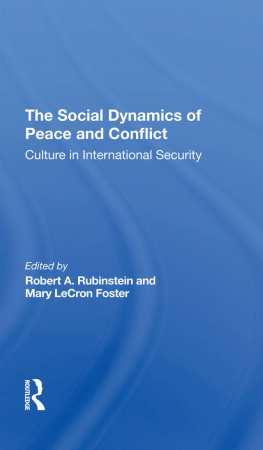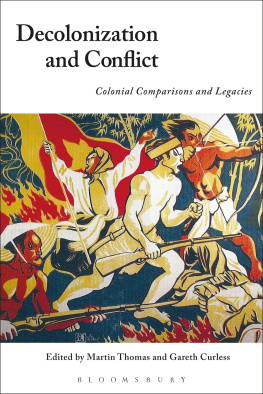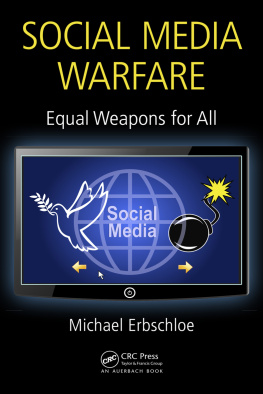2015 SJ Striker, Ph.D., Hollin-Phoenix Consulting, LLC. All rights reserved. This book or any portion thereof may not be reproduced or used in any manner whatsoever without the express written permission of the publisher except for the use of brief quotations in a book review.
ISBN: 978-1-68222-806-7 (Print)
ISBN: 978-1-68222-807-4 (eBook)
ABSTRACT
The Humanity of Warfare: Social Science Capabilities and the Evolution of Warfare addresses the changing nature of conflict and the new focus represented in the Counter-insurgency (COIN) doctrine. Now that the populations welfare is placed at the center, understanding culture and social dynamics becomes critical. Military commanders and the populations welfare are inextricably intertwined and victory now depends upon the success of this paradigm-shifting doctrine.
This book takes a penetrating look at the socio-cultural enablers, subject matter experts and social scientists who assist the military in understanding the indigenous culture and populations they hope to serve and protect. Throughout the course of the book, the reader gains an understanding of how the Social Scientist can help the military understand the key socio-cultural issues, dynamics, and leaders necessary to achieve success.
Chapter two demonstrates specific examples of relevant socio-cultural products that have greatly enhanced the militarys ability to interact successfully with the population of Afghanistan. Chapter three informs the respective commanders on how to best enable their socio-cultural team with specific needs and requirements. Chapter four demonstrates the critical skills, education, and abilities socio-cultural team members must have to be successful in a conflict environment. Chapter five reveals peacetime socio-cultural capabilities designed to inform and prepare military commands by bringing the unique perspectives, analysis, and socio-cultural expertise into their processes to create the most culturally prepared deploying unit as humanly possible before deployment. In short, to fully exploit the socio-cultural capability with the goal to protect lives within vulnerable populations and the occupying soldiers, and achieve objectives.
DEDICATION
This book is dedicated to
Z- A True Son of Afghanistan
ACKNOWLEDGEMENTS
To My Team Leaders who exemplify the paragon virtues of leadership, mission, and friendship:
Kenneth Soto, Colonel, U.S. Army
Donald Amburn, Colonel, U.S. Army (ret.)
Frederick Saunders, Major, U.S. Air Force (ret.)
A special thanks to:
Anton Badri
&
Catie Dreher
For their invaluable expertise
BLOOD CANNOT BE WASHED OUT WITH BLOOD
Afghan Proverb
TESTIMONIALS
Dr. Striker provided actionable intelligence for the most difficult domain, the human domain in Kunar, Nuristan, and Nangarhar. Tribes, insurgency, corruption. Social Scientist in the right spot at the right time. Dr. Striker and the [SC] team provided the critical link between the Afghan population and the US Army, prevented conflict, cleared up cultural misunderstandings, and created bonds that will last a lifetime.
Frederick Saunders, President, SocialScience1.com
I had the privilege of working with Dr. Striker on his second deployment to Afghanistan, so I was able to see his tremendous ability to research the local population and interpret perceptions and translate them to valuable bits of information to make operational decisions. Im convinced that human terrain or understanding the cultural nuances of the indigenous population is a key ingredient to winning a counterinsurgency. I can unequivocally say that in my 32 years of military experience, I have not come across anyone who is more dedicated to his mission than Dr. Striker.
Colonel Kenneth Soto, U.S. Army.
Dr. Striker contributed greatly to the mission of the ISAF Joint Command, Security Partnering through his expertise and diligenceexhibited tenacity, motivation, excellent work ethic, and mission focus by working closely with the Afghan national Army soldiers by bringing us their unique perspectives and solutions. He is a valuable asset with a unique and varied skill set. His contribution was exemplified in his winning Best Product Award with his study on the root causes of ANA Attrition.
Brigadier General William ONeill, U.S. Army
In military operations, understanding the local situation is vital. Without understanding local grievances, leadership, tribal dynamics, economic activity, and the needs and desires of the local people, military commanders are severely handicapped when choosing the best course of action. Social science can make all the difference because field research provides the answers that commanders need to make the right decisions. Sam Striker is an accomplished master practitioner in the field and presents a lively and authoritative guide in this work that is required reading for anyone interested in US overseas operations.
Douglas Grindle, field researcher, reporter and program
manager in Afghanistan for the US Army, USAID,
and multiple media outlets.
War has changed. The way we wage it should have changed as well. Very often that is not the case. In a world where you only win a war if CNN says you did and where, in the words of Dr. Striker, the population has been placed as the absolute center of all significant conflicts, the need to truly know thy enemy and, even more importantly, know thy friend are the most important resources available to military commanders and their civilian leadership. In this very compelling book Dr. Striker describes the discipline of social science applied to war. Sam Striker is both a great narrator and a very knowledgeable social scientist - a powerful combination when authoring a book about conflict management.
Gennaro Buonocore, public affairs officer and historian for U.S. Naval Special Warfare and author of The Afghan Paradox and Failure of the European Multiculturalism - The Islamist Crusade
What crystallized out of the various multi-disciplinary viewpoints Social Science brought to the table, was that our goal was to find out the why rather than how or the more obvious what. Once we knew why the insurgency existed (whether for economic, political, religious, historic, etc. reasons), we could cure the disease rather than continuously battling the symptoms. I think what the U.S. Government tried to do was to bring highly educated and intelligent people to their areas of interest and asked them to uncover the social and human currents the insurgency already knew about and utilized thus knowledge to their advantage. Using Social Science, we were able to uncover the population-centric mechanisms the opposition used and disrupt them.
Anton Badri, former research manager and author
Successful stabilization operations begin with a good cultural understanding of the environment
Tony Cruz, Lieutenant Colonel, U.S. Army and
former Human Terrain Team Leader
In todays brave new world of deviant globalization and hybrid warfare, military commanders have never had a greater need for socio-cultural information about the rapidly changing area of operations. Social scientists can help provide a deeper understanding of how to keep civilian populations safe in conflict zones, while minimizing the risk to our troops.
Dr. Michele Devlin, Professor of Global Health, University of

